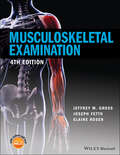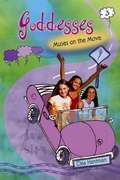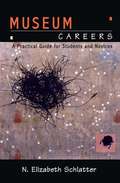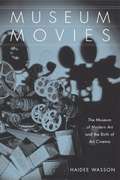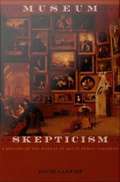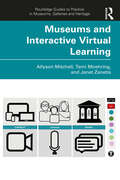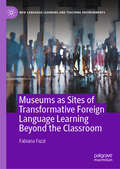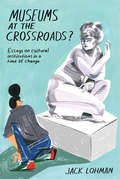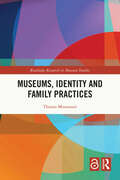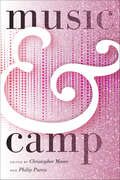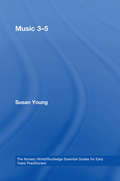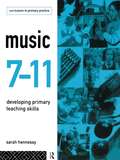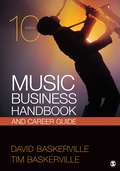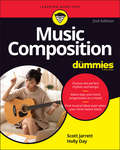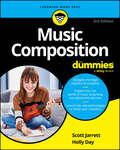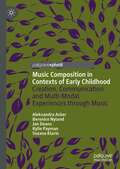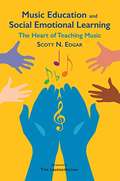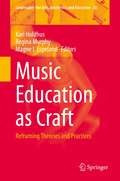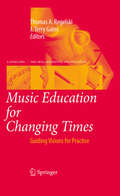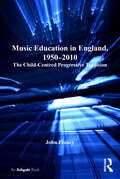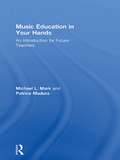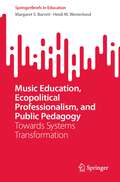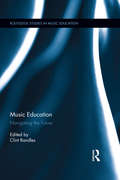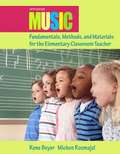- Table View
- List View
Musala Kathawak - මූසල කතාවක්
by N. Sirisena - එම්. සිරිසේනඇන්ටන් චෙකොව්ගේ A Dull Story නම් කෘතියෙහි පරිවර්තනය යි.
Musculoskeletal Examination
by Elaine Rosen Joseph Fetto Jeffrey M. GrossMusculoskeletal Examination is a user-friendly textbook on the techniques of physical examination. Written by a physiatrist, orthopedic surgeon, and physical therapist, it has a uniquely multidisciplinary approach. Musculoskeletal Examination covers the complete basic examination and basic principles of normal and abnormal musculoskeletal function are fully explained, leading you to the correct differential diagnosis. The new fourth edition is now in full colour throughout and includes over 750 detailed illustrations, X-rays and MRIs, and more than 100 photographs showing examination techniques. It also includes a companion website at www.wiley.com/go/musculoskeletalexam featuring 107 MCQs and links to videos demonstrating key examination methods.Musculoskeletal Examination is perfect as a quick reference guide, while the detailed descriptions and clinically relevant examples of frequently encountered conditions will help even the most novice practitioner gain the understanding necessary to make a correct diagnosis and determine a successful treatment plan. It is ideal for physical therapists, physiatrists, orthopedists, medical students, practitioners, and all those involved in sports medicine and clinical massage.
Muses on the Move (Goddesses #3)
by Clea HantmanA muse on a mission, with Pocky at the wheel. Thalia: "I gotta go. Can't we please stop?" Era: "I want a mochaccino. I need one. C'mon, please?" Polly: "I have to admit, I'm kind of restless."
Museum Careers: A Practical Guide for Students and Novice
by N. Elizabeth SchlatterThis concise volume is the place to start for anyone considering a career in museums. Expert curator Elizabeth Schlatter outlines the nature of the profession, the types of museums, and the types of jobs within museums, including salary ranges. She tells the reader the kinds of training needed, how to secure a job, and how to move up the ladder once you are working in the filed. Schlatter discusses the pros and cons, rewards and challenges of embarking on a museum career. Interviews with a host of other museum professionals show the various pathways that people take within the field. For novices in the field, students in museum studies programs, or anyone considering this as a career choice, Schlatter's book is an essential starting point.
Museum Movies: The Museum of Modern Art and the Birth of Art Cinema
by Haidee WassonHaidee Wasson provides a rich cultural history of cinema's transformation from a passing amusement to an enduring art form by mapping the creation of the Film Library of the Museum of Modern Art (MoMA), New York, established in 1935. The film library pioneered an expansive moving image network, comprising popular, abstract, animated, American, Canadian, and European films.
Museum Skepticism: A History of the Display of Art in Public Galleries
by David CarrierIn Museum Skepticism, art historian David Carrier traces the birth, evolution, and decline of the public art museum as an institution meant to spark democratic debate and discussion. Carrier contends that since the inception of the public art museum during the French Revolution, its development has depended on growth: on the expansion of collections, particularly to include works representing non-European cultures, and on the proliferation of art museums around the globe. Arguing that this expansionist project has peaked, he asserts that art museums must now find new ways of making high art relevant to contemporary lives. Ideas and inspiration may be found, he suggests, in mass entertainment such as popular music and movies. Carrier illuminates the public role of art museums by describing the ways they influence how art is seen: through their architecture, their collections, the narratives they offer museum visitors. He insists that an understanding of the art museum must take into account the roles of collectors, curators, and museum architects. Toward that end, he offers a series of case studies, showing how particular museums and their collections evolved. Among those who figure prominently are Baron Dominique Vivant Denon, the first director of the Louvre; Bernard Berenson, whose connoisseurship helped Isabella Stewart Gardner found her museum in Boston; Ernest Fenollosa, who assembled much of the Asian art collection now in the Museum of Fine Arts, Boston; Albert Barnes, the distinguished collector of modernist painting; and Richard Meier, architect of the J. Paul Getty Center in Los Angeles. Carrier's learned consideration of what the art museum is and has been provides the basis for understanding the radical transformation of its public role now under way.
Museums and Interactive Virtual Learning (Routledge Guides to Practice in Museums, Galleries and Heritage)
by Allyson Mitchell Tami Moehring Janet ZanetisMuseums and Interactive Virtual Learning provides informal educators with practical resources that will help them to build dynamic digital engagement experiences within their own cultural organizations. Presenting vignettes from experienced museum educators and end users, as well as scientific data and practical resources, the book highlights the mutual benefits that Interactive Virtual Learning (IVL) programs offer to the museum and those visiting from a distance. Chapters mirror the step-by-step process of developing reputable IVL programs and emphasize how important it is for cultural organizations to encourage cross-departmental collaboration, if they wish to ensure that their programs align with the overall goals of the organization. Providing a thorough overview of the technologies, budget, marketing and staff requirements, the authors offer a realistic depiction of the work involved in building content for digital engagement. Emphasizing the importance of assessing existing programming, the book shows how institutions can adapt content to fit a virtual format and create inclusive digital engagement opportunities that reach local, national, and international audiences. Museums and Interactive Virtual Learning is an essential guide for professionals who are tasked with interpreting the content of a cultural organization and building lasting digital engagement opportunities. It will be particularly useful to those looking to reach diverse audiences.
Museums as Sites of Transformative Foreign Language Learning Beyond the Classroom (New Language Learning and Teaching Environments)
by Fabiana FazziThis book takes a look at the affordances of engaging second/foreign language students in educational projects that bridge the gap between the classroom and the museum. Studies on language learning and teaching beyond the classroom have shown that students learn in different settings and through different types of activities and that their learning is influenced by the intersection of different dimensions. Drawing on both language and museum learning and teaching research, this book discusses the aspects that make the museum an ideal language learning setting and then outlines evidence-based pedagogical guidelines to design effective learning experiences for language learners across the classroom and the museum. It will be of interest to graduate students, language teachers, teacher trainers, museum educators, and researchers in fields including Educational Linguistics, Anthropological Linguistics, and Museum Studies (Education).
Museums at the Crossroads?: Essays on Cultural Institutions in a Time of Change
by Jack LohmanIn this collection of illuminating essays, Jack Lohman, chief executive officer of the Royal British Columbia Museum, shares his views on the role of museums in the various cultures of the world, on the importance of architecture and design in the personality of a museum, on the challenges of creating resilient cultural institutions in the face of financial crises, and much more. He speaks from the heart and from his many years of experience in some of the great museums, in London, Rio de Janeiro, Cape Town, Warsaw and many other cities around the world.
Museums, Identity and Family Practices (Routledge Research in Museum Studies)
by Theano MoussouriMuseums, Identity and Family Practices locates museum participation and meaning making in the realm of everyday family practices, which are central to understanding the role museums play in family social life.Drawing on a substantial amount of data from a wide range of sources, Moussouri discusses the importance of understanding how family practices are enacted across settings and how the arena of the museum can facilitate certain family practices and impede others. Developing and theorising key concepts, the book elucidates the key research themes, including everyday family practice; meaning making; and the structural characteristics of museums as arenas for the family visit activity. The analysis is rooted in a dialectical theoretical framework specifically developed to bridge the macrolevel (social order or the arena of the museum) and microlevel (family practices).Museums, Identity and Family Practices offers a novel and holistic approach to studying contemporary families and, as such, is key reading for scholars and students of museum and heritage studies, family studies, visitor studies, cultural studies, education, sociology and anthropology. Museum and heritage professionals working with families in different communities around the world will also find this book relevant to their practice.The Open Access version of this book, available at http://www.taylorfrancis.com, has been made available under a Creative Commons Attribution-Non Commercial-No Derivatives (CC-BY-NC-ND) 4.0 license.
Music & Camp (Music/culture Ser.)
by Christopher Moore and Philip PurvisThis collection of essays provides the first in-depth examination of camp as it relates to a wide variety of twentieth and twenty-first century music and musical performances. Located at the convergence of popular and queer musicology, the book provides new research into camp's presence, techniques, discourses, and potential meanings across a broad spectrum of musical genres, including: musical theatre, classical music, film music, opera, instrumental music, the Broadway musical, rock, pop, hip-hop, and Christmas carols. This significant contribution to the field of camp studies investigates why and how music has served as an expressive and political vehicle for both the aesthetic characteristics and the receptive modes that have been associated with camp throughout twentieth and twenty-first-century culture.Hardcover is un-jacketed.
Music 3-5 (Essential Guides for Early Years Practitioners)
by Susan YoungThis book gives information, ideas and principles for music with three to five year olds that are both down-to-earth and up-to-date. Written in a style which is engaging and readable, it integrates recent theory and practice illustrating the discussion with examples and ideas taken from real life. Chapters in this inspiring and engaging book show practitioners how to: connect with the educational concepts and principles of using music in early years settings recognise and understand children’s musical starting points foster creativity through music support listening and communication through music learn the key areas of listening, singing, using instruments and dancing develop children’s musical understanding widen opportunities for music through resources, new technologies and visiting artist projects. Early years practitioners and students will find this a valuable introduction to music with young children. More experienced practitioners will find the contemporary ideas a source of inspiration. Books in this series address key issues for early years practitioners working in today’s Foundation Stage environments. Each title is packed full of practical activities, support, advice and guidance, all of which is in line with current government early years policy. The authors use their experience and expertise to write accessibly and informatively, emphasising through the use of case studies the practical aspects of the subject, whilst retaining strong theoretical underpinnings throughout.
Music 7-11: Developing Primary Teaching Skills
by Sarah HennessyTeachers have often felt unnecessarily apprehensive about teaching without music without being gifted musicians themselves.Music 7-11 dispels the myth that to teach music effectively a teacher has to "be musical" and provides teachers with the opportunity of developing both the basic subject knowledge and the confidence needed to deliver enjoyable and valuable music lessons. It does this by encouraging practical engagement with the subject through making and listening to music, reflecting on experiences and sharing views.
Music Business Handbook and Career Guide Tenth Edition
by David Baskerville Tim BaskervilleThe special Tenth Edition of this powerhouse best-selling text maintains its tradition as the most comprehensive, up-to-date guide to the music industry. The breadth of coverage that this book offers is unlike that of any other resource available.
Music Composition For Dummies
by Holly Day Scott JarrettYou can hum it, but can you write it down? When most people think of a composer, they picture a bewigged genius like Mozart or Beethoven frenetically directing mighty orchestras in the ornate palaces of Vienna. While that may have been the case once upon a time, modern composers make themselves heard far beyond the classical conservatoire and concert hall. These days, soundtracks are in high demand in industries such as TV, film, advertising, and even gaming to help create immersive and exciting experiences. Whatever your musical ambitions—composing a dark requiem in a beautiful Viennese apartment or producing the next great Star Wars-like movie theme in LA—the fully updated Music Composition For Dummies hits all the right notes to help you become confident in the theory and practice of composition. To help you translate your musical ideas from fleeting tunes in your head to playable bars and notation on paper, professional composer and instructor Scott Jarrett and music journalist Holly Day take you on a friendly step-by-step journey through the process of musical creation, including choosing the right rhythms and tempos, creating melodies and chord progressions, and working with instruments and voices. You’ll learn how to match keys and chords to mood, use form to enhance your creativity, and write in different styles from pop to classical—and you’ll even learn how to keep hammering away when inspiration eludes you. Organize and preserve your musical ideas Formalize your knowledge with professional vocabulary Get familiar with composition apps and software Make a demo and market on social media Filled with musical exercises to help you acquire the discipline you need for success, Music Composition For Dummies has everything you need to turn your inner soundtrack into a tuneful reality!
Music Composition For Dummies
by Holly Day Scott JarrettCreate the next big pop hit, bang out a catchy jingle, or write an iconic film score, with music composition skills Today's composers create music for television, film, commercials, and even video games. Music Composition For Dummies brings you up to speed with the theory and technicality of composing music. With easy-to-understand content that tracks to a typical music composition intro course, this book will teach you how to use music theory to write music in a variety of forms. You'll discover the latest tech tools for composers, including composing software and online streaming services where you can publish your musical creations. And you'll get a rundown on the world of intellectual property, so you can collab and remix fairly, while retaining all the rights to your own creations. Get a clear introduction to music theory and songwriting concepts Learn about composition best practices for movies, TV, video games, and beyond Explore sample music to help you understand both artistic and commercial composition Launch into the latest technologies to mix and share your creations Great for music students and aspiring artists, Music Composition For Dummies, is an easy-to-read guide to writing and producing all kinds of tunes.
Music Composition in Contexts of Early Childhood: Creation, Communication and Multi-Modal Experiences through Music
by Jan Deans Berenice Nyland Aleksandra Acker Kylie Payman Suzana KlarinThis book explores the narratives of a group of four-year-old children in a composition project in an Australian early learning centre. The participants, centre staff and a composer, Stephen Leek, contributed a number of music sessions for the children, including five original songs. The book showcases young children’s communicative ability and sensitivity to wider issues. The staff in the centre have a strongly voiced philosophy that is enacted through arts-based pedagogy and incorporates significant themes including a respect for Aboriginal culture and custodial responsibility towards a sustainable future for the earth. Examples of adult and children’s ideas are illustrated through music making, singing, dancing, words, drawings and paintings, which provide insights into a world where children are viewed as active citizens and the arts have rights. The book describes the context of the centre, the history of projects and details one project as an example of “lifeworthy learning”.
Music Education and Social Emotional Learning: The Heart of Teaching Music
by Scott N. EdgarMusic educators are in a prime position to help students become socially and emotionally competent while at the same time develop excellent musicianship. For every child to be successful in the music classroom, teachers need to be aware of the whole student. How do music educators create success when students every day struggle with social awareness, bullying, communication, problem solving, and other challenges.
Music Education as Craft: Reframing Theories and Practices (Landscapes: the Arts, Aesthetics, and Education #30)
by Regina Murphy Kari Holdhus Magne I. EspelandThis book is a collection of leading international authors in the field of music education taking the concept of 'craft' as a starting point to deconstruct and reconstruct their understanding of the practices and theories of music education. Their insights draw from deep wells of resources located in historical, philosophical, epistemological, musicological and educational traditions that lead to rich and complex insights on the evolving field of music education. In so doing, they generate a constellation of new understandings and illustrations of what crafts can mean in this field. Historically, the idea of craft was typically associated with a skill or experience in knowing how to do or make something, or an activity of some kind that requires specific professional skills. In Old Norse, the concept for craft was kraptr, meaning strength and virtue, while Old English and continental use was associated with power and physical strength, as well as skill. When these definitions of ‘crafts’ are infused into contemporary understandings of the field of music education as a professional field, a whole new set of possible interpretations are unearthed. Such insights are not exhaustive, but rather, point the way in which this professional, diverse, inclusive and ambiguous field might continue to evolve in the 21st century.
Music Education for Changing Times
by J. Terry Gates Thomas A. RegelskiBased on topics that frame the debate about the future of professional music education, this book explores the issues that music teachers must confront in a rapidly shifting educational landscape. The book aims to challenge thought and change minds. It presents a star cast of internationally prominent thinkers in and beyond music education. These thinkers deliberately challenge many time-worn traditions in music education with regard to musicianship, culture and society, leadership, institutions, interdisciplinarity, research and theory, and curriculum. This is the first book to confront these issues in this way. This unique book has emerged from fifteen years of international dialog by The MayDay Group, an organization of more than 250 music educators from over 20 countries who meet yearly to confront issues in music teaching and learning.
Music Education in England, 1950-2010: The Child-Centred Progressive Tradition
by John FinneyJohn Finney examines the child-centred progressive tradition to create a fresh way of evaluating ideas and practices that have evolved since 1950, that have shaped the lives of music teachers and their pupils, and that have now become disfigured, residual and altogether lost in the light of social, cultural and political change. The book is a critique of the present situation with an intention to expose the dangers in our current pursuit of future gains that are thought to serve the making and sustaining of the social order. The project draws in major debates of the period, along with their protagonists, counter-pointed by the voices of teachers and pupils. At the same time, the structuring voices of policy and governance become ever louder as we reach the present time. Finney presents a compelling, analytical account through a series of six episodes, each seeking to capture the spirit and fervour characteristic of a particular phase within the period studied. In the concluding chapter the narrative developed is reviewed. From this the idea of music education as an ethical pursuit is proposed. Finney argues that classroom relationships can be thought of as playfully dialogic, where teacher and pupil remain curious, and where there is serious attention to what is to be taught and why. This will always need to be negotiated, with the expressed and inferred needs of children working together to find a critical approach to what is being learnt. Finney's book provides fresh inspiration for practitioners and new challenges for researchers, and as such is a landmark in the field of arts and music education.
Music Education in Your Hands: An Introduction for Future Teachers
by Michael L. Mark Patrice MaduraMusic Education in Your Hands is a textbook for the introductory course in Music Education. Written for future classroom music teachers, the book provides an overview of the music education system , illuminating the many topics that music educators need to know, including technology, teaching methods, curricular evolution, legislation, and a range of societal needs from cultural diversity to evolving tastes in music. It encompasses a broad picture of the profession, and how the future of music education rests in the hands of today’s student teachers as they learn how to become advocates for music in our schools. FEATURES A balance of sound historical foundations with recent research and thinking; Coursework that is appropriate in level and length for a one semester introductory course; Actual dialogue between undergraduate music education majors and teachers, illustrating pertinent issues teachers must face; An emphasis on opportunities in the greater community beyond the walls of the school that music teachers should be familiar with; Suggested topics for activities and critical thinking for every chapter; A companion web site including student and instructor resources
Music Education, Ecopolitical Professionalism, and Public Pedagogy: Towards Systems Transformation (SpringerBriefs in Education)
by Margaret S. Barrett Heidi M. WesterlundThis book challenges the dominant expertise professionalism rationale for music education by responding to the call to develop ‘ecological awareness’ at a time when all professions have a moral obligation to place sustainable and interdependent life at the center. The book aims to expand music education’s professional horizons to acknowledge the responsibility of the music field to contribute to the demands of complex questions of sustainability and identify the ways in which sustainable music education may be strengthened through an activist relational ecological stance. It suggests a radical moral turn by asking: What if music education is recognised as part of the problem of sustaining unsustainability? and What if music teacher education was developed in and through dialogue with a futures perspective? These questions are interrogated through a critical analysis of the historical positioning of music in education and an interdisciplinary application of theories of ecology and professionalism.
Music Education: Navigating the Future (Routledge Studies in Music Education #1)
by Clint RandlesEducation involving music is a multifaceted and ever-altering challenge. As new media, technologies, and pedagogies are developed, academics and practitioners must make sure that they are aware of current trends and where they might lead. This book features studies on the future of music education from emerging scholars in the field. These studies are then supplemented by commentaries from established leaders of the music education community. Music Education covers topics such as music and leisure, new forms of media in music teaching and learning, the role of technology in music learning, popular music tuition in the expansion of curricular offering, and assessment of music education research. As such, it is an excellent reference for scholars and teachers as well as guide to the future of the discipline.
Music Fundamentals, Methods, And Materials For The Elementary Classroom Teacher
by Rene Boyer Michon RozmajzlDesigned for prospective teachers without extensive music backgrounds, Music Fundaments, Methods and Materials for the Elementary Classroom Teacher, 5th Edition , provides both a thorough overview of the basic elements of music and a clear sequence of instructional steps that allows readers to participate in the same learning process they will later use as teachers. The text gives a proper overview to the basic elements of music, and a clear sequence of instructional steps in order to teach music to children in elementary school. This market-leading textbook can also be used as a major resource for elementary general music education specialists in the classroom.

